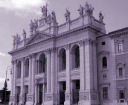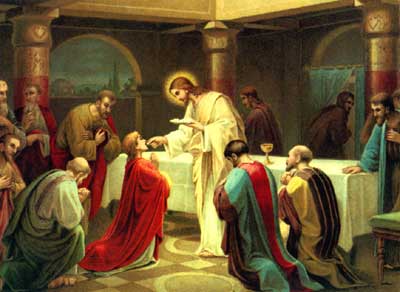Maundy Thursday
We enter singing a humble song:
“For us, no boasting” (Gal 6:14).
No boasting, that is, of anything that is ours.
For who am I and who are you to boast
in the presence of the Mystery?
Who am I and who are you to boast
on this the night of God’s doing,
the night of the covenant?
“Father,” says the deacon to the priest
at the beginning of the Divine Liturgy,
“it is time for the Lord to act!”
And so, it is all his doing, not ours.
It is time for the Lord to act!
“For us, no boasting,
but in the Cross of our Lord Jesus Christ,
who is health and life and resurrection to us,
by whom we are saved and set free (cf. Gal 6L14).
If you are sick; he is health.
If you are in the grip of death; he is life.
If you have stumbled and fallen low,
once, twice, three times or more,
he is resurrection.
If you are bound up and fettered,
if you are pushed down, or held back,
or laden with burdens too heavy to bear,
he is deliverance and freedom.
If you are oppressed in sin’s narrow place,
he takes you by the hand
and tonight, yes, tonight,
he leads you out into the vast and spacious place
of his prayer to the Father.
“This Father, is my desire,
that all those whom thou hast entrusted to me
may be with me where I am,
so as to see my glory, thy gift made to me,
in that love which thou didst bestow upon me
before the foundation of the world” (Jn 17:24).
This is the birthnight of Eucharistic adoration,
the night of a hushed amazement,
the night of believing disbelief
and of wordless wonder.
This is the night of God at table with man.
Not only does this Companion-God sit at our board to share our bread:
he becomes Bread in every mouth.
This is the night of the Blood of the Lamb:
the birthday of the Chalice,
the first wave of that immense crimson tide
that tomorrow will flow gushing from the pierced side.
This is the night of the astonishing humility of God.
the night of God bending low
to wash,
to kiss,
to perfume the very feet
that will run from the fearful garden in the night,
and from the proud praetorium,
and from the Cross terrible against dark and heavy skies.
“Before you run from me,
O you whom I have chosen to run after me,
let me wash your feet
and mark them sweetly with the imprint of my kiss.
You did not choose me, but I chose you” (Jn 15:16).
This kiss to your feet is the pledge of my paschal absolution.
My feet, you will see them pierced by a nail;
yours, I would pierce them with a kiss,
that turning, you would come back to me
who have come so far in search of you.
Jerusalem, Jerusalem, turn back,
turn back to the Lord your God!”
Tonight our Priest begins his ascent:
the solemn procession to the high place of his preaching:
to the noble Tree
from which his voice will go out through all the earth.
Tonight our Priest, without leaving us,
goes into the hidden sanctuary beyond the veil (Heb 6:19);
he appears in the presence of God on our behalf (Heb 9:23),
taking not the blood of goats and calves
but his own blood, thus securing an eternal redemption (Heb 9:12).
Tonight the Lamb without blemish is set before us.
Tonight his Blood is given,
not to be smeared on doorposts and lintels,
but to sanctify our lips
and moisten every parched tongue;
to warm every heart grown cold
with a libation of fire;
to give sweetness for bitterness,
and boldness for fear.
Those marked by the Blood of Lamb,
those with the Blood of the Lamb wet upon their lips
and fragrant on their breath
have passed from death to life.
Every mouth sanctified by the Blood
is, in the Father’s eyes, the mouth of the First-Born Son.
Every prayer uttered from Blood-blessed lips,
every kiss offered,
every sigh and every groan,
the Father receives
as coming from the Son.
“In that day you will know
that I am in the Father,
and you in me, and I in you” (Jn 14:20).
The psalmist too sang of the Chalice and of the Blood:
“I will lift up the chalice of salvation,
and call upon the name of the Lord” (Ps 115:13).
Lifted up, it is our thanksgiving: a sun blazing red against the sky.
Pressed to our lips, it is our salvation: the antidote, the remedy,
one drop of which is enough to cure this weary world of every ill.
The Apostle handed on to us
what had been handed on to him.
O humble and glorious Tradition!
Ours it is to receive what he received,
(to transmit and not to betray,)
to cherish what he cherished,
to obey the commandment he obeyed,
to adore the mystery he adored.
“This is my body which is for you.
Do this in remembrance of me. . . .
This chalice is the new covenant in my Blood.
Do this, as often, as you drink it, in memory of me” (1 Cor 11:24-25).
This is the night of the new priesthood.
Awed they are, not quite understanding and not quite misunderstanding
the fearful spectacle of God bent prostrate at their feet.
He, sinless, kneels to absolve the sinner
while the sinner, seated,
has nought to offer but two bare journey-worn feet
and the story they tell.
“What I am doing you do not know now,
but afterward you will understand . . . .
For I have given you an example,
that you also should do as I have done to you” (Jn 13:7, 15).
Feet they will wash, kneeling before them,
but more than feet,
hearts caked with the hard crust of sin,
and polluted souls,
and faces bearing the traces of blood and tears.
Then we did not know what he was doing,
but now we understand the mystic absolution.
“Receive the Holy Spirit.
If you forgive the sins of any, they are forgiven;
if you retain the sins of any they are retained” (Jn 20:22-23).
For us, no boasting but in what Love has left us:
the Bread and the Chalice
making present His Sacrifice;
and priests with feet washed clean and anointed hands
to pronounce the Absolution,
to lift high the Oblation.
And behind the sacramental veils
shines the Face for which we yearn:
the Face of immolated Purity,
the Face of Beauty humbled,
the Face of the Priest,
the Face of the Victim,
the Face of Holiness,
the Face of Crucified and Triumphant Love.
In looking, adore Him.
In adoring, look at Him.
And so, pass over
from what is old to what is new,
from the land of heavy burdens to the land of freedom,
from darkness to life,
from sin to holiness,
from groans to jubilations,
from tears to laughter,
from sorrow to bliss,
from combat to peace,
from struggle to rest,
from death to life
It is the Passover of the Lord (Ex 12:11).
Exodus 12:1-14
Psalm 116:12-18
1 Corinthians 11:23-26
John 13:1-15





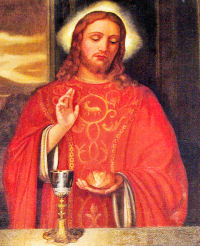
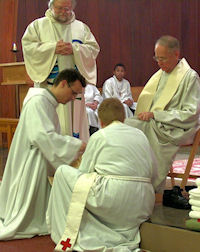 During the evening of Holy Thursday, the Mass of the Lord's Supper is celebrated. It is celebrated in the evening because the Passover began at sundown. There is only one Mass, at which the whole community and priests of the parish participate. This is a very joyful Mass, as we recall the institution of the Holy Eucharist and the priesthood. The priests wear white vestments, the altar is filled with flowers, the Gloria is sung and the bells are rung. After the Gloria, we shall not hear organ music and the bells until the Easter Vigil. The Liturgy of the Mass recalls the Passover, the Last Supper, which includes the Washing of the Feet. The hymn Ubi Caritas or Where Charity and Love Prevail is usually sung at this time. After the Communion Prayer, there is no final blessing. The Holy Eucharist is carried in procession through Church and then transferred into a place of reposition, usually a side chapel. The hymn Pange Lingua is also usually sung at this time.
During the evening of Holy Thursday, the Mass of the Lord's Supper is celebrated. It is celebrated in the evening because the Passover began at sundown. There is only one Mass, at which the whole community and priests of the parish participate. This is a very joyful Mass, as we recall the institution of the Holy Eucharist and the priesthood. The priests wear white vestments, the altar is filled with flowers, the Gloria is sung and the bells are rung. After the Gloria, we shall not hear organ music and the bells until the Easter Vigil. The Liturgy of the Mass recalls the Passover, the Last Supper, which includes the Washing of the Feet. The hymn Ubi Caritas or Where Charity and Love Prevail is usually sung at this time. After the Communion Prayer, there is no final blessing. The Holy Eucharist is carried in procession through Church and then transferred into a place of reposition, usually a side chapel. The hymn Pange Lingua is also usually sung at this time. 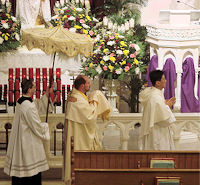 When the Eucharist is processed to the altar of repose after the Mass of the Lord's Supper, we should remain in quiet prayer and adoration, keeping Christ company. There is a tradition, particularly in big cities with many parishes, to try and visit seven churches and their altar of repose during this evening.
When the Eucharist is processed to the altar of repose after the Mass of the Lord's Supper, we should remain in quiet prayer and adoration, keeping Christ company. There is a tradition, particularly in big cities with many parishes, to try and visit seven churches and their altar of repose during this evening. 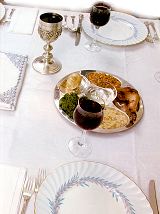 In imitation of Christ's last supper, many Christians prepare a seder meal or the pasch. Celebrating a paschal meal helps us comprehend the plan of redemption. We see the lamb, cooked whole, with no bones broken, foreshadowing the death of Christ, the Lamb of God. We eat the unleavened bread and recall to mind the Eucharist. We eat the whole meal in prayerful reminder of that Last Supper that Jesus spent with His apostles, His friends, instituting Holy Orders and leaving His greatest gift, the Holy Eucharist.
In imitation of Christ's last supper, many Christians prepare a seder meal or the pasch. Celebrating a paschal meal helps us comprehend the plan of redemption. We see the lamb, cooked whole, with no bones broken, foreshadowing the death of Christ, the Lamb of God. We eat the unleavened bread and recall to mind the Eucharist. We eat the whole meal in prayerful reminder of that Last Supper that Jesus spent with His apostles, His friends, instituting Holy Orders and leaving His greatest gift, the Holy Eucharist. 